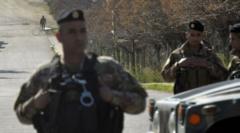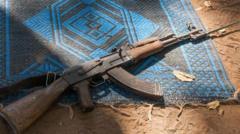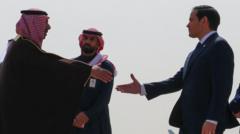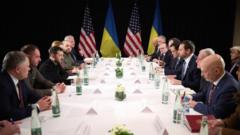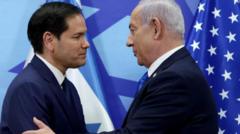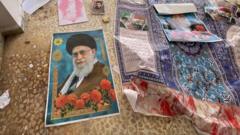Israeli military forces are seeking an additional extension for their withdrawal from southern Lebanon, a move that comes after a ceasefire deal meant to stabilize the region. Lebanon's government strongly opposes the delay, emphasizing its push for full territorial sovereignty as fears remain over Israel's prolonged military presence.
Israel Seeks Further Delay for Troop Withdrawal from Lebanon
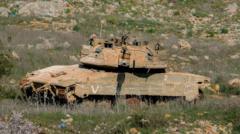
Israel Seeks Further Delay for Troop Withdrawal from Lebanon
Israel's request for an extension of troop withdrawal from southern Lebanon raises new regional concerns amidst ongoing tensions.
Israel is reportedly aiming to extend the presence of its troops in southern Lebanon for an additional 10 days, pushing the new deadline to February 28, according to a Western diplomatic source. The original timeline for withdrawal was set to commence next week, following a ceasefire deal brokered by the United States and France on November 27, which aimed to conclude a 14-month conflict with Hezbollah. Under the terms, both Israeli forces and Hezbollah fighters were to vacate southern Lebanon, a region that has been a focal point of tension for decades.
Lebanese authorities, however, have signaled their disapproval, with President Joseph Aoun denying allegations that another extension has been agreed upon. The government is adamant about its demand for complete withdrawal by the initial February deadline. There remains deep-rooted fear in Lebanon stemming from Israel's previous occupation of the south from 1982 to 2000, and many view the continued Israeli presence as a continuation of historical grievances.
Complicating matters further, the ceasefire has already seen one extension, as Israeli officials claimed Lebanon had not fully upheld its commitments, leading to heightened allegations of delays. As the Lebanese military prepares to deploy thousands of troops to assert control in southern Lebanon, pressure mounts for both nations to adhere to the ceasefire agreement.
Despite the ceasefire, Israel has resumed targeted operations against Hezbollah, reportedly conducting low-altitude flights over Beirut. This situation reflects ongoing tensions, particularly after Hezbollah's significant losses in the previous conflict with Israel, which resulted in thousands of deaths and extensive destruction in Lebanon.
Hezbollah continues to maintain a strong support base within Lebanon's Shia community, although their military capabilities have faced severe depletion due to the recent conflict. The ramifications of Israel's militaristic ambitions and the regional geopolitical landscape remain uncertain as both parties navigate this complex trajectory of withdrawals, sovereignty, and security.
The situation is delicate, as each side weighs its strategic objectives against the backdrop of historical conflicts, current military dynamics, and the need for regional stability.
Lebanese authorities, however, have signaled their disapproval, with President Joseph Aoun denying allegations that another extension has been agreed upon. The government is adamant about its demand for complete withdrawal by the initial February deadline. There remains deep-rooted fear in Lebanon stemming from Israel's previous occupation of the south from 1982 to 2000, and many view the continued Israeli presence as a continuation of historical grievances.
Complicating matters further, the ceasefire has already seen one extension, as Israeli officials claimed Lebanon had not fully upheld its commitments, leading to heightened allegations of delays. As the Lebanese military prepares to deploy thousands of troops to assert control in southern Lebanon, pressure mounts for both nations to adhere to the ceasefire agreement.
Despite the ceasefire, Israel has resumed targeted operations against Hezbollah, reportedly conducting low-altitude flights over Beirut. This situation reflects ongoing tensions, particularly after Hezbollah's significant losses in the previous conflict with Israel, which resulted in thousands of deaths and extensive destruction in Lebanon.
Hezbollah continues to maintain a strong support base within Lebanon's Shia community, although their military capabilities have faced severe depletion due to the recent conflict. The ramifications of Israel's militaristic ambitions and the regional geopolitical landscape remain uncertain as both parties navigate this complex trajectory of withdrawals, sovereignty, and security.
The situation is delicate, as each side weighs its strategic objectives against the backdrop of historical conflicts, current military dynamics, and the need for regional stability.

